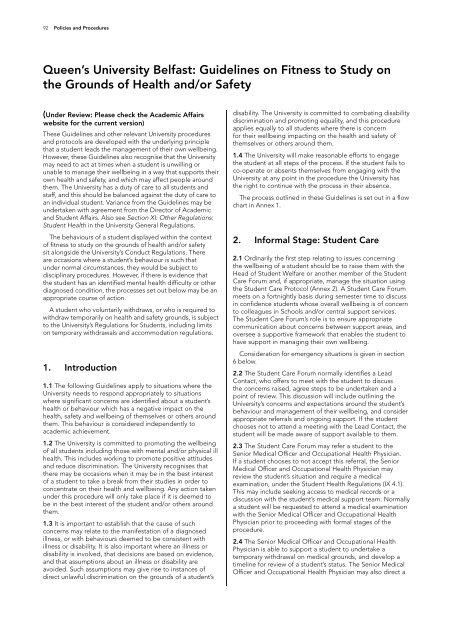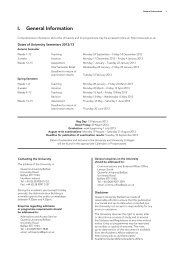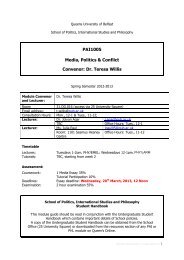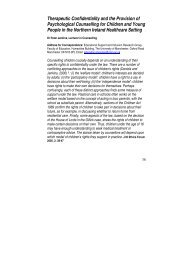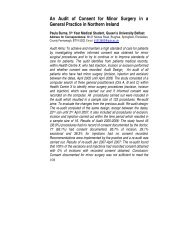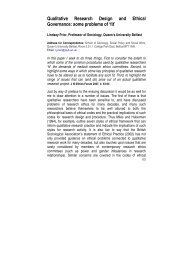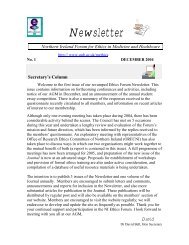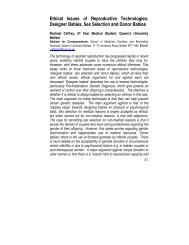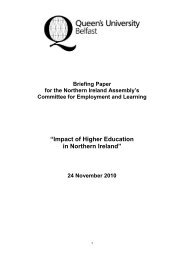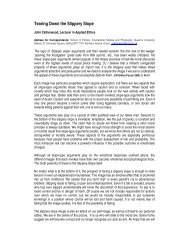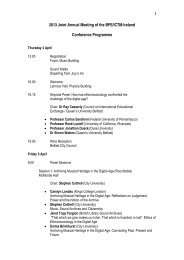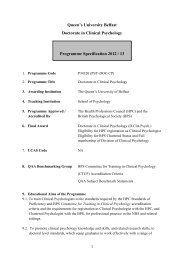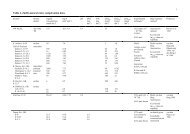University Calendar for Postgraduate Students 2012/13 - Queen's ...
University Calendar for Postgraduate Students 2012/13 - Queen's ...
University Calendar for Postgraduate Students 2012/13 - Queen's ...
You also want an ePaper? Increase the reach of your titles
YUMPU automatically turns print PDFs into web optimized ePapers that Google loves.
92 Policies and Procedures<br />
Queen’s <strong>University</strong> Belfast: Guidelines on Fitness to Study on<br />
the Grounds of Health and/or Safety<br />
(Under Review: Please check the Academic Affairs<br />
website <strong>for</strong> the current version)<br />
These Guidelines and other relevant <strong>University</strong> procedures<br />
and protocols are developed with the underlying principle<br />
that a student leads the management of their own wellbeing.<br />
However, these Guidelines also recognise that the <strong>University</strong><br />
may need to act at times when a student is unwilling or<br />
unable to manage their wellbeing in a way that supports their<br />
own health and safety, and which may affect people around<br />
them. The <strong>University</strong> has a duty of care to all students and<br />
staff, and this should be balanced against the duty of care to<br />
an individual student. Variance from the Guidelines may be<br />
undertaken with agreement from the Director of Academic<br />
and Student Affairs. Also see Section XI: Other Regulations:<br />
Student Health in the <strong>University</strong> General Regulations.<br />
The behaviours of a student displayed within the context<br />
of fitness to study on the grounds of health and/or safety<br />
sit alongside the <strong>University</strong>’s Conduct Regulations. There<br />
are occasions where a student’s behaviour is such that<br />
under normal circumstances, they would be subject to<br />
disciplinary procedures. However, if there is evidence that<br />
the student has an identified mental health difficulty or other<br />
diagnosed condition, the processes set out below may be an<br />
appropriate course of action.<br />
A student who voluntarily withdraws, or who is required to<br />
withdraw temporarily on health and safety grounds, is subject<br />
to the <strong>University</strong>’s Regulations <strong>for</strong> <strong>Students</strong>, including limits<br />
on temporary withdrawals and accommodation regulations.<br />
1. Introduction<br />
1.1 The following Guidelines apply to situations where the<br />
<strong>University</strong> needs to respond appropriately to situations<br />
where significant concerns are identified about a student’s<br />
health or behaviour which has a negative impact on the<br />
health, safety and wellbeing of themselves or others around<br />
them. This behaviour is considered independently to<br />
academic achievement.<br />
1.2 The <strong>University</strong> is committed to promoting the wellbeing<br />
of all students including those with mental and/or physical ill<br />
health. This includes working to promote positive attitudes<br />
and reduce discrimination. The <strong>University</strong> recognises that<br />
there may be occasions when it may be in the best interest<br />
of a student to take a break from their studies in order to<br />
concentrate on their health and wellbeing. Any action taken<br />
under this procedure will only take place if it is deemed to<br />
be in the best interest of the student and/or others around<br />
them.<br />
1.3 It is important to establish that the cause of such<br />
concerns may relate to the manifestation of a diagnosed<br />
illness, or with behaviours deemed to be consistent with<br />
illness or disability. It is also important where an illness or<br />
disability is involved, that decisions are based on evidence,<br />
and that assumptions about an illness or disability are<br />
avoided. Such assumptions may give rise to instances of<br />
direct unlawful discrimination on the grounds of a student’s<br />
disability. The <strong>University</strong> is committed to combating disability<br />
discrimination and promoting equality, and this procedure<br />
applies equally to all students where there is concern<br />
<strong>for</strong> their wellbeing impacting on the health and safety of<br />
themselves or others around them.<br />
1.4 The <strong>University</strong> will make reasonable ef<strong>for</strong>ts to engage<br />
the student at all steps of the process. If the student fails to<br />
co-operate or absents themselves from engaging with the<br />
<strong>University</strong> at any point in the procedure the <strong>University</strong> has<br />
the right to continue with the process in their absence.<br />
The process outlined in these Guidelines is set out in a flow<br />
chart in Annex 1.<br />
2. In<strong>for</strong>mal Stage: Student Care<br />
2.1 Ordinarily the first step relating to issues concerning<br />
the wellbeing of a student should be to raise them with the<br />
Head of Student Welfare or another member of the Student<br />
Care Forum and, if appropriate, manage the situation using<br />
the Student Care Protocol (Annex 2). A Student Care Forum<br />
meets on a <strong>for</strong>tnightly basis during semester time to discuss<br />
in confidence students whose overall wellbeing is of concern<br />
to colleagues in Schools and/or central support services.<br />
The Student Care Forum’s role is to ensure appropriate<br />
communication about concerns between support areas, and<br />
oversee a supportive framework that enables the student to<br />
have support in managing their own wellbeing.<br />
Consideration <strong>for</strong> emergency situations is given in section<br />
6 below.<br />
2.2 The Student Care Forum normally identifies a Lead<br />
Contact, who offers to meet with the student to discuss<br />
the concerns raised, agree steps to be undertaken and a<br />
point of review. This discussion will include outlining the<br />
<strong>University</strong>’s concerns and expectations around the student’s<br />
behaviour and management of their wellbeing, and consider<br />
appropriate referrals and ongoing support. If the student<br />
chooses not to attend a meeting with the Lead Contact, the<br />
student will be made aware of support available to them.<br />
2.3 The Student Care Forum may refer a student to the<br />
Senior Medical Officer and Occupational Health Physician.<br />
If a student chooses to not accept this referral, the Senior<br />
Medical Officer and Occupational Health Physician may<br />
review the student’s situation and require a medical<br />
examination, under the Student Health Regulations (IX 4.1).<br />
This may include seeking access to medical records or a<br />
discussion with the student’s medical support team. Normally<br />
a student will be requested to attend a medical examination<br />
with the Senior Medical Officer and Occupational Health<br />
Physician prior to proceeding with <strong>for</strong>mal stages of the<br />
procedure.<br />
2.4 The Senior Medical Officer and Occupational Health<br />
Physician is able to support a student to undertake a<br />
temporary withdrawal on medical grounds, and develop a<br />
timeline <strong>for</strong> review of a student’s status. The Senior Medical<br />
Officer and Occupational Health Physician may also direct a


